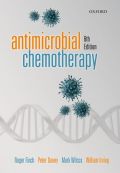
This sixth edition continues to be a valuable resource for undergraduates and graduates requiring a thorough grounding in the scientific basis and clinical application of antimicrobial drugs. It is updated to include the most recently licensed agents, and contains new guidance on prescribing practice and infection control. Antimicrobial agents are essential for the treatment of life-threatening infections and for managing the burden of minor infections in the community. In addition, they play a key role in organ and bone marrow transplantation, cancer chemotherapy, artificial joint and heart valve surgery. Unlike other classes of medicines, they are vulnerable to resistance from mutations intarget microorganisms, and their adverse effects may extend to other patients(increased risk ofcross-infection). As a consequence, there is a constant requirement for new agents, as well as practices that ensure the continued effective prescribing oflicensed agents.Public awareness and concerns about drug resistant organisms has led to widespread publicity and political action in the UK, Europe and worldwide. The control of drug resistance and the implementation of good prescribing practice arenow legal requirements in the UK as a result of the UK Health Act (2008). These fundamental changes underscore the need for a thorough understanding of the advantages and risks associated with specific antibiotic choices.This sixth edition of Antimicrobial Chemotherapy continues to be a valuable resource for undergraduates and graduates requiring a thorough grounding in thescientific basis and clinical application of these drugs. This new edition isupdated to include the most recently licensed agents, notably in the treatment of viral infections including HIV/AIDS, and contains new guidance on prescribing practice and infection control practices that limit the development and spread of resistantorganisms. INDICE: Historical Introduction Preface Part One - Antimicrobial chemotherapy - the agents and their general properties Inhibitors of bacterial cell wall synthesis Inhibitors of bacterial protein synthesis Synthetic antibacterial agents and miscellaneous antibiotics Antivirals - an introduction Antiviral drugs Anti-HIV Agents Antifungal agents Antiprotozoal and anthelminthic agents Part Two - Antimicrobial chemotherapy - drug resistance, impact and control Theproblem of resistance The genetics and mechanisms of acquired resistance Control of the spread of resistance Part Three - Antimicrobial chemotherapy - the science and practice of use Laboratory investigations and the treatment of infection General principles of the treatment of infection Pharmacokinetic and pharmacodynamic principles Prescribing in children and the elderly Outpatient Parenteral Antibiotic Prescribing Adverse drug reactions Preventing infection -chemoprophylaxis and immunoprophylaxis (immunisation schedule) Guidelines, formularies and antimicrobial policies Antimicrobial stewardship and the multi-professional antimicrobial management team Part Four - Antimicrobial chemotherapy - their therapeutic use Respiratory tract infections Topical use of antimicrobial agents Urinary tract infections Sexually transmitted infections Gastrointestinal infections Serious blood stream infections Infections of the bones and joints Infections of the central nervous system Infections of the skin andsoft tissues Tuberculosis and other mycobacterial diseases Infections in the immunocompromised patient including HIV/AIDS Viral infections HIV infections Viral hepatitis Parasitic diseases Ostscript: the development and marketing of antimicrobial drugs
- ISBN: 978-0-19-969765-6
- Editorial: Oxford University
- Encuadernacion: Rústica
- Páginas: 408
- Fecha Publicación: 05/01/2012
- Nº Volúmenes: 1
- Idioma: Inglés
